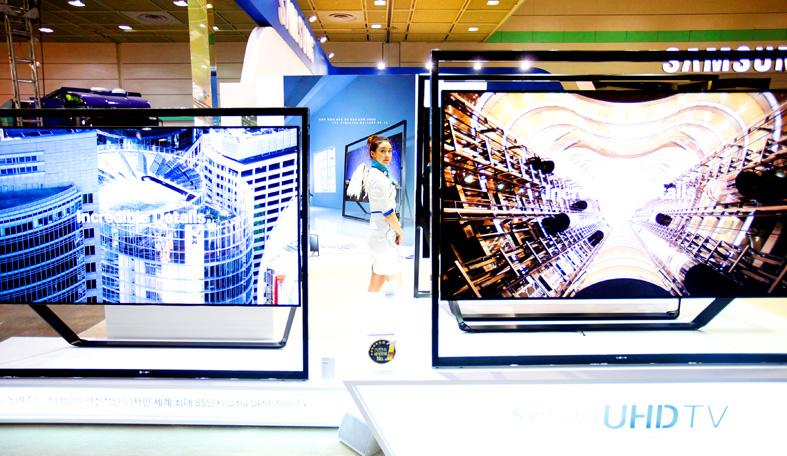The display unit of Samsung Electronics Co yesterday said that it is to extend its production of panels for TVs and monitors, as more people seek home entertainment during the COVID-19 pandemic.
Samsung Display Co’s decision to extend panel production in South Korea for an unspecified period overrides its announcement in March that it would end all production by the end of this year to focus on more advanced technology.
Samsung Display said the length of the extension would depend on profitability considerations and market conditions.

Photo: Reuters
It had in late October said that it was considering a “short-term” extension.
Local media outlet IT Chosun earlier yesterday reported that production would be extended by a year at the request of Samsung Electronics’ TV manufacturing division, citing unnamed technology industry sources.
A Samsung Display spokeswoman declined to comment on the report.
The stay-at-home trend that was sparked by the COVID-19 pandemic led to a 30 percent quarter-on-quarter increase in global panel demand in the third quarter of this year amid TV and notebook demand, technology research firm TrendForce said.
However, TrendForce added that an influx of more panels from Chinese manufacturers would likely worsen a supply glut next year.
Samsung had produced LCD panels in both South Korea and China, but earlier this year sold a majority stake in its Suzhou, China, production unit to China Star Optoelectronics Technology Co (華星光電).

Taiwanese suppliers to Taiwan Semiconductor Manufacturing Co. (TSMC, 台積電) are expected to follow the contract chipmaker’s step to invest in the US, but their relocation may be seven to eight years away, Minister of Economic Affairs J.W. Kuo (郭智輝) said yesterday. When asked by opposition Chinese Nationalist Party (KMT) Legislator Niu Hsu-ting (牛煦庭) in the legislature about growing concerns that TSMC’s huge investments in the US will prompt its suppliers to follow suit, Kuo said based on the chipmaker’s current limited production volume, it is unlikely to lead its supply chain to go there for now. “Unless TSMC completes its planned six

Intel Corp has named Tasha Chuang (莊蓓瑜) to lead Intel Taiwan in a bid to reinforce relations between the company and its Taiwanese partners. The appointment of Chuang as general manager for Intel Taiwan takes effect on Thursday, the firm said in a statement yesterday. Chuang is to lead her team in Taiwan to pursue product development and sales growth in an effort to reinforce the company’s ties with its partners and clients, Intel said. Chuang was previously in charge of managing Intel’s ties with leading Taiwanese PC brand Asustek Computer Inc (華碩), which included helping Asustek strengthen its global businesses, the company

Power supply and electronic components maker Delta Electronics Inc (台達電) yesterday said second-quarter revenue is expected to surpass the first quarter, which rose 30 percent year-on-year to NT$118.92 billion (US$3.71 billion). Revenue this quarter is likely to grow, as US clients have front-loaded orders ahead of US President Donald Trump’s planned tariffs on Taiwanese goods, Delta chairman Ping Cheng (鄭平) said at an earnings conference in Taipei, referring to the 90-day pause in tariff implementation Trump announced on April 9. While situations in the third and fourth quarters remain unclear, “We will not halt our long-term deployments and do not plan to

The New Taiwan dollar and Taiwanese stocks surged on signs that trade tensions between the world’s top two economies might start easing and as US tech earnings boosted the outlook of the nation’s semiconductor exports. The NT dollar strengthened as much as 3.8 percent versus the US dollar to 30.815, the biggest intraday gain since January 2011, closing at NT$31.064. The benchmark TAIEX jumped 2.73 percent to outperform the region’s equity gauges. Outlook for global trade improved after China said it is assessing possible trade talks with the US, providing a boost for the nation’s currency and shares. As the NT dollar